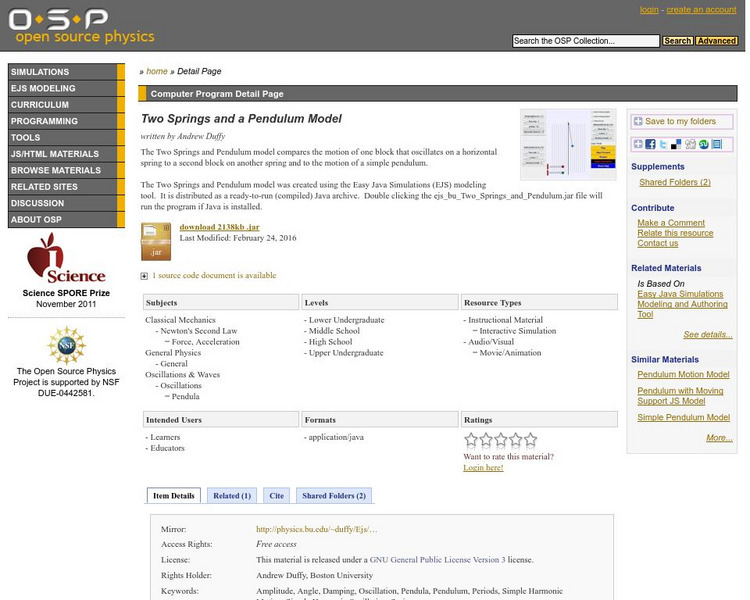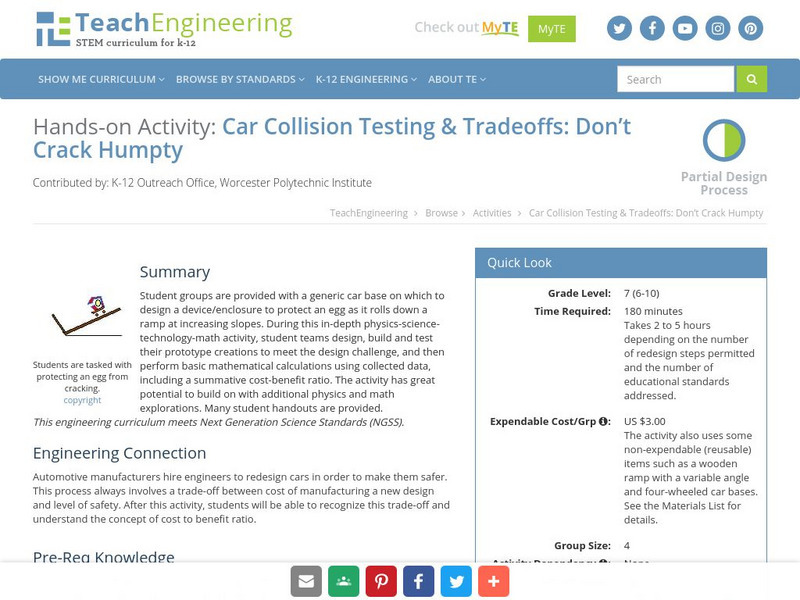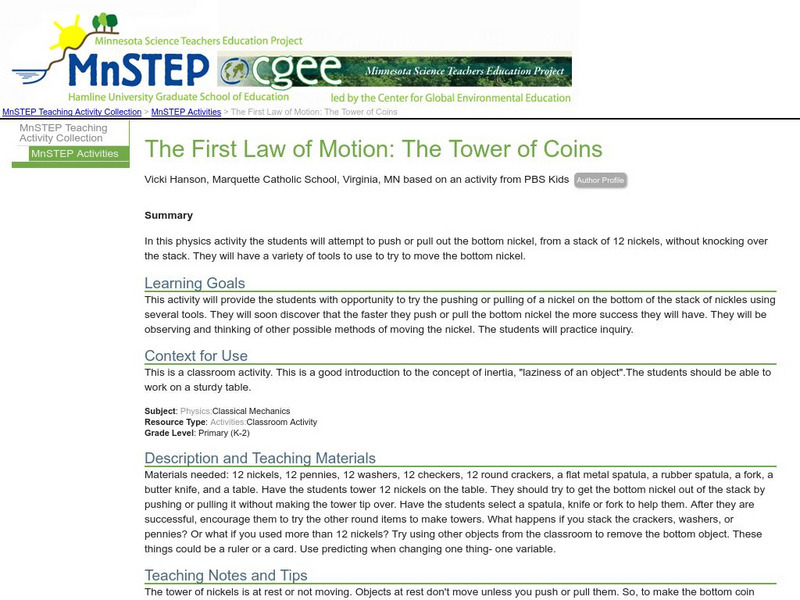University of Virginia
Uva: The Real World Air Resistance
A contrast of Galileo and Aristotle's view of inertia and motion. Describes air resistance force and how its reality seems to initially support Aristotle's view.
TeachEngineering
Teach Engineering: Physics Tug of War
In this activity, students will learn about Newton's 2nd Law of Motion. They will learn that the force required to move a book is proportional to the weight of the book. Engineers use this relationship to determine how much force they...
Other
Wikibooks: Physics Study Guide
A handy resource that gives an overview of equations and definitions pertinent to an introductory, college-level physics course, with two of its three sections focusing on motion-related topics and principles.
CK-12 Foundation
Ck 12: Physics Simulation: Hot Air Balloon
[Free Registration/Login Required] Learn about Newton's 2nd Law - the relationship between force, mass, and acceleration for a hot air balloon using this interactive simulation. A PDF worksheet and a video tutorial are also available....
NASA
Nasa: Beginner's Guide to Aerodynamics
Includes exhaustive information and a wealth of activities pertaining to aerodynamics and the physics of flight.
NASA
Nasa: Vectors
This site from NASA provides an excellent tutorial on vectors and their use in physics to describe the motion of objects. Vector addition and resolution are illustrated.
American Association of Physics Teachers
Com Padre Digital Library: Open Source Physics: Two Springs and a Pendulum Model
Swing virtual pendulums and compare the motion of one oscillating weight on a horizontal spring to a second weight on another spring. Then, compare how these motions differ from the motion of a simple pendulum.
TeachEngineering
Teach Engineering: Rocket Me Into Space
One of the exciting challenges for engineers is the idea of exploration. This lesson looks more closely at Spaceman Rohan, Spacewoman Tess, their daughter Maya, and their challenges with getting to space, setting up satellites, and...
Wikimedia
Wikipedia: Isaac Newton
In the Spanish langauge, discover the life and works of Isaac Newton. This site highlights his work and also provides links to obtain a greater understanding of these individual works.
The Wonder of Science
The Wonder of Science: Ms Ps2 2: Forces, Mass and the Motion of an Object
Cover standards for middle school force, mass, and the motion of an object with this site. Find work samples, phenomena, assessment templates, and videos that directly address standard.
Soft Schools
Soft Schools: Physics Quizzes: Force, Mass Acceleration
Assess your understanding of force, mass and acceleration and the relationship amongst the three with this interactive multiple choice quiz. Immediate feedback is offered.
University of Wisconsin
The Why Files: Friction and Fly Balls
Try to find the sweet spot for hitting a baseball so that it travels the greatest horizontal distance.
TeachEngineering
Teach Engineering: Car Collision Testing & Tradeoffs: Don't Crack Humpty
Student groups are provided with a generic car base on which to design a device/enclosure to protect an egg as it rolls down a ramp at increasing slopes. During this activity, student teams design, build and test their prototype...
Science Education Resource Center at Carleton College
Serc: Com Padre: Science on a Skateboard Applications of Newton's Third Law
In this lesson, students explore Newton's Third Law of Motion. It involves an activity where they throw a medicine ball while seated on a wheeled cart with minimal friction between the cart and the floor. After completing the experiment,...
Science and Mathematics Initiative for Learning Enhancement (SMILE)
Smile: Third Law of Motion
This Illinois Institute of Technology site provides a teacher lesson plan for an activity in which students use spring balances and carts to investigate the action-reaction relationship for any given force. Includes directions, materials...
Science Education Resource Center at Carleton College
Serc: Mn Step: The First Law of Motion: The Tower of Coins
Students learn about inertia in this simple experiment. They create a stack of twelve round objects, beginning with nickels, and try to remove the bottom object without toppling the tower. Various tools are provided for them to use for...
Walter Fendt
Walter Fendt: Projectile Motion
A short interactive activity to show the movement of a projectile. You can change the values of the initial height, velocity, angle of inclination, the mass and the gravitational acceleration.
Physics Classroom
The Physics Classroom: The Car and the Wall
The Physics Classroom uses an animation of a car crash to lead its discussion on the law of inertia.
NBC
Nbc Learn: Science of Golf
NBC Learn, in partnership with the United States Golf Association, uncovers the science, technology, engineering and math behind the game of golf. For lesson plans provided by the National Science Teachers Association, open the video and...
TeachEngineering
Teach Engineering: Action Reaction! Rocket
Students construct a rocket from a balloon propelled along a guide string. They use this model to learn about Newton's three laws of motion, examining the effect of different forces on the motion of the rocket.
CK-12 Foundation
Ck 12: Physics Simulation: Drawbridge
[Free Registration/Login Required] Learn about torque balance in the context of a medieval drawbridge using this interactive simulation. A PDF worksheet and a video tutorial are also available. [3:47]
Other
Federal Aviation Administration: Anti Gravity Marble [Pdf]
This experiment examines Newton's Second Law of Motion. Learn how centrifugal and centripetal force help to keep a marble in a can when turned upside down.
American Association of Physics Teachers
Com Padre Digital Library: Open Source Physics: Swinging Atwood's Machine Model
Variation on the standard Atwood's Machine model, where one hanging mass swings like a pendulum and the other remains stationary. Manipulate the conditions and observe the results.
University of Colorado
University of Colorado: Ph Et Interactive Simulations: Gravity Force Lab
Manipulate the mass and distance of two objects to see how these properties change the gravity force.




















